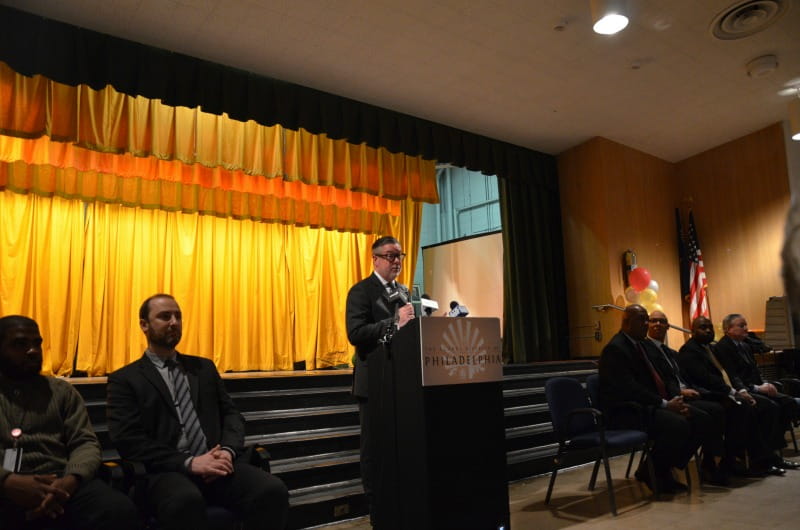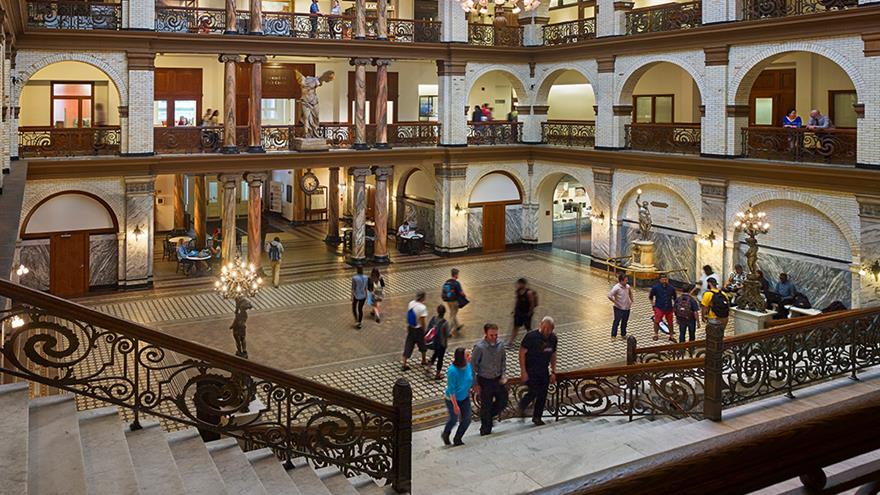How Drexel Won a $30M Grant for West Philadelphia Schools
 By Ben Seal
By Ben Seal

Drexel President John Fry spoke at a press conference at Morton McMichael School announcing the $30 million grant.
The work to secure the five-year, $30 million grant awarded Tuesday by the U.S. Department of Education to West Philadelphia as part of the Promise Neighborhoods Program began in 2011.
Drexel University has been involved from the start in helping to develop the Promise Neighborhoods program design. It began five years ago with planning meetings, as members of the Mantua neighborhood discussed their goals for the community and shared their frustrations that children from the neighborhood weren’t being given the tools needed to reach their potential.
Lucy Kerman, PhD, senior vice provost for University and Community Partnerships, had a seat at the table for those community meetings, which spurred the application in 2013 for Promise Zone designation, as part of the Obama Administration's program to recognize the needs and opportunities of high-poverty areas across the country. In 2014, a two-mile stretch of West Philadelphia was designated a Promise Zone. The Promise Neighborhoods grant will provide the funding necessary to turn the community’s visions for education into reality, especially for its neighborhood schools, she said.
“This really is the signature federal grant that we were hoping to attract,” Kerman said. “It brings the money we need to really support the principals in professional development, and support the students. It allows us to put more funds into early childhood education and expand the number of daycare centers we work with to a larger area. It allows us to engage more parents.”
The grant, which will be paired with $76 million in matching funds from the city of Philadelphia, the Philadelphia School District, Drexel and area nonprofits, will deliver resources for seven schools in the Promise Neighborhood ranging from kindergarten through high school. Kerman and Drexel School of Education Dean Nancy Songer, PhD, collaborated on the application process, and Kerman’s office will administer the grant money.
The money will be used to expand early literacy and science education, empower parents to get involved in their children’s education, improve access to education and job training for young adults, and provide behavioral support to the schools and the wider Mantua community. In a neighborhood with disproportionately high rates of poverty, the grant will serve as a spark for progress, Kerman said.
“With those kinds of funds, it begins to be possible to take what the collaborative has planned for the schools and actually begin to implement it,” Kerman said.
At a press conference Wednesday morning at Morton McMichael School at 36th Street and Fairmount Avenue — one of seven public schools that will benefit from the grant — Philadelphia Mayor Jim Kenney acknowledged the “transformative effect” Drexel has had on West Philadelphia.
“You aren’t just creating new-economy jobs,” Kenney said. “You’re also making sure that these jobs are accessible to your neighbors and our citizens, and that’s really fantastic.”
Speaking moments after a group of McMichael students recited Langston Hughes’ poem “Dreams” — “when dreams go, life is a barren field frozen with snow” — Drexel President John Fry reminded the students that they were the most important people in the room. He reflected on the collaboration between Drexel and its surrounding community that allowed the Promise Neighborhoods grant to materialize, and expressed his hope that the young students in the room could one day attend Drexel if they wish.
“We want to promote the 21st century skills needed to ensure that every child born in the Promise Zone has the full range of tools, support and knowledge necessary to be successful in the knowledge economy that’s growing right before our eyes and in their own backyard,” Fry said.
To get them to that point, Songer said the School of Education will take the lead on facilitating the education programs to come out of the new funding. Drexel faculty and graduate students will provide professional development for principals and other leaders at the seven local schools. The School of Education will also develop measures to ensure the schools are progressing both in learning outcomes and in “school climate,” Songer said. It will require hiring a new team of individuals to organize and channel the University’s expertise, she said.
Although the grant process moved quickly — Drexel began work in the spring and submitted its 130-page proposal in the summer — the work undergirding the successful application has been going on for five years. In that time, the University developed relationships with the nonprofits, community organizations, schools and families that all had a hand in securing the landmark funding. The grant will allow the ideas and efforts that have been developing for years to truly blossom, she said.
“We’ve built this very strong partnership that has multiple pieces to it, but we haven’t manifested and taken advantage of that partnership in realizing big, new projects,” Songer said. “So this is definitely the catalyst and foundation for a whole new vision of what’s possible in terms of programs and expected outcomes.”
For Kerman, the grant brings a sense of accomplishment but also a newfound responsibility.
“It’s about being a good steward of funds that will support this community, and recognizing that the vision is really the community’s,” Kerman said. “Our role is to make it possible.”
In This Article
Drexel News is produced by
University Marketing and Communications.
